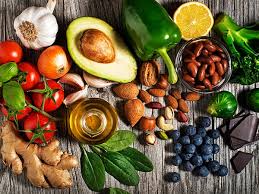Antioxidant Fruits
Antioxidant fruits are not created equal. Some antioxidant fruits may have more antioxidant content compared to other fruits. Others may have nutrients with antioxidant properties; others may only have vitamins. But whatever the case, it is still quite evident that antioxidants are great for our health: the more colours, the better.
The human body derives its energy from the utilization of nutrients and oxygen as fuel. But oxygen, for all its benefits and positive effects, may also carry with it some negative ripple effect. When processing oxygen in the body (a process called “oxidation), oxygen byproducts are produced. These byproducts, called free radicals, are highly reactive substances that may cause damage to cells. The antioxidant substances found in antioxidant fruits may work to neutralize these free radicals and in the process, prevent them from causing damage.
Antioxidant Fruits: The Benefits
Many people are already familiar with antioxidant fruits, such as citrus fruits which are known for their high vitamin C content or apples for their beta-carotene. Consuming lots of antioxidant fruits in your diet will help boost the body’s defence against free radicals and oxidative stress (damage caused by free radicals). Oxidative stress is a process which many a scientist has linked with the development of chronic and degenerative diseases such as heart disease and cancer.
Antioxidants may be plain fruits, cereals, and vegetables. Some antioxidant can also be prepared in dried, powdered forms, like dietary supplements or pills. There is some research though those antioxidants may be taken better if you include them in your diet.
Fruit, vegetables, and cereals in your diet have additional benefits compared to taking antioxidant supplements alone. A good idea is a supplement your diet as well as a balanced diet to maximise the health benefits. Scientists point out that this might be because consuming antioxidant fruits in food may provide a combination of lesser-known but potent antioxidant substances, which may afford more significant effect than that of any single nutrient or individual antioxidant supplement. Although experts still recommend taking an antioxidant supplement, this boosts overall antioxidant intake as we are unlikely to meet our body’s daily requirements when consuming a western diet. I great antioxidant supplement can be found here.
In a recent issue of the Journal of Nutrition, the total antioxidant content of several antioxidant fruits, including fruits, berries, vegetables, cereals, nuts, and legumes, was analyzed.
According to their findings, the overall best sources of antioxidant fruits under the berry category are dog rose, sour cherry, blackberry, strawberry, raspberry, crowberry, blueberry, and black currant. Under the antioxidant fruits, the type is pomegranates, grape, orange, plum, pineapple, lemon, dates, kiwi, Clementine, and grapefruit. For legumes, broad beans topped the list while in the nut category, walnuts and sunflower seeds occupied the first and second spots, respectively.
Other antioxidant foods include kale, chilli pepper, red cabbage, barley, millet, corn, ginger, and red beets.
Antioxidant Foods
Below is a list of some on the many antioxidant food sources and what the main vitamin or mineral content is.
Vitamin C is found in:
- Guava
- Peppers (red, yellow and green)
- Kiwi fruit
- Strawberries
- Citrus fruits
- Papaya
- Brussels sprouts
- Broccoli
- Leafy vegetables
- Tomatoes
- Potatoes
Vitamin E is found in:
- Almonds
- Sunflower seeds
- Vegetable oils
- Leafy vegetables
- Peanuts (including peanut butter)
- Sweet potato
- Avocado
Selenium is found in:
- Brazil nuts
- Fish
- Shellfish
- Meat and poultry
- Eggs
- Grain products
- Wheat germ and wheat bran in whole grain products
- Beans
- Oats
Carotenoids are found in:
- Kale
- Tomatoes and tomato products
- Spinach
- Sweet potato
- Carrots
- Leafy vegetables
- Pumpkin and other squashes
- Guava
- Watermelon
- Grapefruit
Flavonoids are found in:
- Berries (especially dark-coloured berries)
- Cherries
- Red grapes
- Onions
- Apples
- Cocoa
- Tea, especially green tea
Polyphenols are found in:
- Extra virgin olive oil
- Dark chocolate
- Blueberries
- Olives
- Hazelnuts
- Plums
As you can see from the list above, there are lots of options if you want to have an antioxidant-rich diet. With that in mind, it shouldn’t surprise you to know that a balanced diet with as many different coloured fresh fruits, vegetables and leaves should insure you’re hitting your daily antioxidant requirements. A good way to load up on all your body’s required nutrients is to add a scoop of Super Green Blend to your shakes or smoothies.
More information on antioxidant foods can be found here, check it out.

